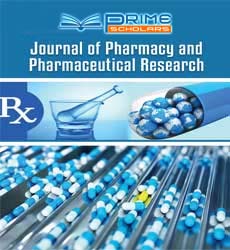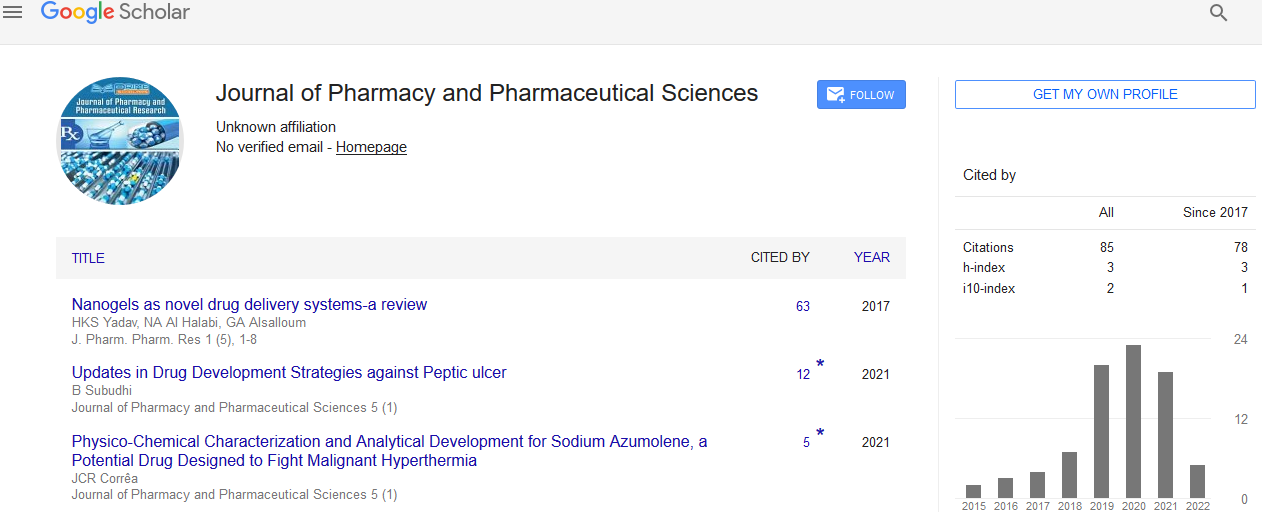Commentary - (2022) Volume 6, Issue 3
Overview on Pharmaceutical Care and Pharmacotherapy
Jenes Carvey*
Department of Pharmacy, University of Fedral, Brazil
*Correspondence:
Jenes Carvey, Department of Pharmacy, University of Fedral,
Brazil,
Email:
Received: 01-Jun-2022, Manuscript No. IPIPR-22-13912;
Editor assigned: 03-Jun-2022, Pre QC No. IPIPR-22-13912(QC);
Reviewed: 17-Jun-2022, QC No. IPIPR-22-13912;
Revised: 22-Jun-2022, Manuscript No. IPIPR-22-13912(R);
Published:
30-Jun-2022, DOI: 10.21767/ipipr.6.3.14
Description
Pharmaceutical care is understood as the differentiation of drug
specialists in order to get the maximum benefit from the pharmacological
drugs of the patients and to consistently pay attention to
the review of their pharmacotherapy. As vocation has evolved from
an article direction (medication allocation) to a patient concentration,
clinical preparation requirements have expanded. This is a
slow but continuous cycle that began from a philosophical point
of view to transform the idea of the pharmacy from item-based
trading tasks into a clinical vocation of local pharmacies. Since his
presentation, there has been a more than appropriate discussion
of the importance of drug supply due to contrasts in pharmacy
frameworks and in the structure of medical care between different
nations. In addition, there are some execution limits that are
related to training, ability, assets and climate. Certainly, there is
awareness of the problem posed by drug use, and various studies
reflect that drug use control is essential as there is a significant
association between gloominess/mortality and pharmacotherapy.
It is therefore conceivable to assess the benefits of drug care for
patient well-being and ultimately for society. Many studies have
been carried out showing that the prescription of medical care
shares its practical value in conditions such as diabetes, high blood
pressure, asthma, hyperlipidaemia, chronic torment, rheumatic
diseases or mental problems, as well as in polymedicated patients.
Much information is currently disseminated in biomedical diaries
with the ultimate goal of demonstrating the clinical, financial, and
humanistic reasonableness of drug supply. The aim of this study
is therefore to focus on the development of this training from its
beginnings to the present day. In addition, we have analysed various
execution programs implemented in countries in Europe, the
United States, and Latin America, focusing on clinical, prudent,
and humanistic outcomes, and also on the persistent idea of drug
treatment problems (DTP), viewed as drug disappointments become
treatment. We believe that the positive results obtained
from various drug delivery projects will bring about a valuable
improvement in patient well-being, but at the same time further
research should be directed towards supporting this change. Drug supply administrations save patients’ lives, impact expenses and
work on understanding the nature of life.38-40 According to a
study on the assumptions for doctors regarding growing drug supply
administrations in Jordan, Jordanian doctors mostly agree with
the idea of drug supply administrations. Rather, they recognize the
usual task of the drug specialist to educate the patient about their
medication. Whatever the case, they had horrifying encounters
with drug specialists administering drug treatments. They do not
believe that drug specialists are willing to practice drug supply services.
41 Pharmacists generally have excellent prospects for conducting
drug supply practices, however, various barriers have been
identified that limit the conduct of drug supply practices in Jordan.
These limitations include the level of understanding of drug delivery
practice, lack of a confidential region of leadership, difficulty
communicating with physicians, and lack of admission to clinical
patient records.
Conclusion
Drug care as a concept has moved the pharmacy profession from a
fundamental focus on the product (the actual drug) to the patient’s
drug treatment and how it should be improved for the individual
patient. The first meaning of the term drug supply was promulgated
by Hepler and however, new definitions have emerged. The
definition, from a Minnesota, USA congregation, originally dating
from 1998, shows restraint and emphasizes that the expert (typically
a drug specialist) is liable for the medication of the patient.
Acknowledgement
The author is grateful to the journal editor and the anonymous
reviewers for their helpful comments and suggestions.
Conflict of Interest
The author declared no potential conflicts of interest for the research,
authorship, and/or publication of this article.
Citation: Jenes C (2022) Overview on Pharmaceutical Care and Pharmacotherapy. J Pharm Pharm Res Vol.6 No.3:14
Copyright: © Jenes C. This is an open-access article distributed under the terms of the Creative Commons Attribution License,
which permits unrestricted use, distribution, and reproduction in any medium, provided the original author and source are
credited

